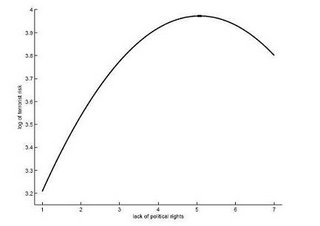Globally, people tend to view poverty and deprivation as a cause of terrorism. However, in a research, conducted by Alberto Abadie at the John F Kennedy School of Government (Harvard University), factors such as GDP per capita, Human Development Index (HDI) and the Gini Index were found to be non-significant predictors of level of terrorism in countries around the globe.
In the study, Abadie used regression for measuring terrorism as measured by World Market Research Center's Global Terrorism Index (WMRC-GTI) upon various indicators of poverty including GDP per capita, HDI (measure of development in terms of health, education and income) , the Gini Index (measure of income or consumption inequality), Freedom House's Political Rights Index (Freedom House, 2004) , certain geopolitical features including include measures of country land area, average elevation, fraction of the country area in tropical climate and landlock and Indices for linguistic, ethnic, and religious fractionalization which measures the probability that two individuals chosen at random from the same country belong to different linguistic, ethnic, or religious groups.
The data suggests that the dependence on GDP per capita, HDI or the Gini index is not statistically significant and fails to explain terrorism differences. However the other variables including differences in linguistics, geography and climate and lack of political rights are significantly related to the incidence of terrorism.
The study, however, suggests that political freedom has a non-monotonic effect on terrorism i.e. terrorism does not rise with more oppression of freedom but is maximum in the intermediate range (E.g., Iraq, which is making a transition from an authoritarian regime to one with more political freedom is witnessing increased amounts of terrorism and North Korea, which has one of the most oppressive regimes in the world, has the lowest levels of terrorism as indicated by the WMRC Global Terrorism Index (2003-2004)
Also, certain geographical areas have been attributed to cause failure to eliminate terrorism such as mountain terrains (Afghanistan) or tropical jungles (Columbia).

Figure 1 Terrorism and Political Freedom (1- Politically Free to 7 - Authoritarian)
Reference:
Poverty, Political Freedom, and the Roots of Terrorism, Alberto Abadie, October 2004

